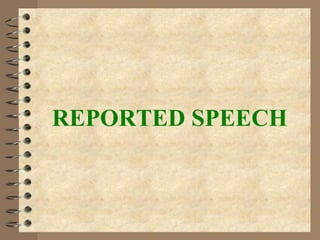
Reportedspeech
- 2. DIRECT SPEECH vs REPORTED SPEECH We often have to give information about what people say or think. In order to do this you can use: DIRECT SPEECH Saying exactly what someone has said is called direct speech (sometimes called quoted speech). Here what a person says appears within quotation marks (“…”) and should be word for word. For example: “Today’s lesson is on presentations,” she said. INDIRECT/ REPORTED SPEECH It doesn’t use quotation marks to enclose what the person said and it doesn’t have to be word for word.
- 3. DIRECT / REPORTED SPEECH We use REPORTED SPEECH when we want to tell another person about a conversation that took place in the past (e.g telephone call, news or a story that someone told us, etc.) Where’s Tom? He said he was feeling ill .
- 5. DIRECT SPEECH REPORTED SPEECH Verb Tense Changes: Direct speech Indirect speech Present simple She said, “It’s cold.” › Past simple She said it was cold. Present continuous She said, “I’m teaching English online.” › Past continuous She said she was teaching English online. Present perfect simple She said, “I’ve been on the web since 1999.” › Past perfect simple She said she had been on the web since 1999. Past simple She said, “I taught online yesterday.” › Past perfect She said she had taught online the day before. Past continuous She said, “I was teaching earlier.” › Past perfect continuous She said she had been teaching earlier. Past perfect She said, “The lesson had already started when he arrived.” › Past perfect NO CHANGE – She said the lesson had already started when he arrived
- 6. Note! – There is no change to could, would, should, might and ought to. Modal verb forms also change Direct speech Indirect speech will She said, “I’ll teach English online tomorrow.” › would She said she would teach English online tomorrow. can She said, “I can teach English online.” › could She said she could teach English online. must She said, “I must have a computer to teach English online.” › had to She said she had to have a computer to teach English online. shall She said, “What shall we learn today?” › should She asked what we should learn that day. may She said, “May I open a new browser?” › might She asked if she might open a new browser.
- 7. Changes in Time and Place expressions: Time Place Now Ago Then Before here there today that day This town/ garden... That town/ garden ... tomorrow the following day OR the day after These cities/ ... Those cities/ ... yesterday the previous day OR the day before last week/ month/ ... the previous week/ month ... OR the week before Next week / month/ ... The following week / month OR the week/ month after
- 10. Reporting Verbs: ADD ADMIT * AGREE ANSWER APOLOGIZE FOR* ARGUE ASSURE COMPLAIN to sb About * DENY * EXPLAIN INFORM OBJECT to * OBSERVE OFFER PROMISE PROTEST against /about * REMARK REPEAT REPLY SUGGEST* WARN * These verbs + ing The most common verbs are: TELL + sb and SAY sth TO sb Followed by THAT ( Remember it can be omitted!)
- 11. REPORTING QUESTIONS Reporting questions are usually introduced by ASK, INQUIRE, WONDER, WANT TO KNOW, etc. When reporting questions, it is especially important to pay attention to: + WORD ORDER : The word order in a reported question is the same as in a statement. The subject comes before the verb. Look at the examples: Question: Are you ready? Statement: I am ready. Question in reported speech: She wanted to know if I was ready. + PUNCTUATION : If the sentence is a statement, end it with a period (.) even if it contains a reported question. Look at the examples: Statement containing a reported question: She asked me what I thought of the new movie. Question containing a reported question: Did she ask what you thought of the new movie?
- 12. A) YES / NO QUESTIONS: Reporting Verb + if or whether + Subject + Verb +... (Order of Reported Question: Subject + Verb - as in Statements) “ Are you working these days?” he said. He asked if/whether I was working those days. (No Question Mark) “ Did you speak to John last night?” she asked She wanted to know if I had spoken to J, the night before. REPORTING QUESTIONS
- 13. A) YES / NO QUESTIONS: Reporting Verb + if or whether + Subject + Verb +... (Order of Reported Question: Subject + Verb - as in Statements) “ Are you working these days?” he said. He asked if/whether I was working those days. (No Question Mark) “ Did you speak to John last night?” she asked She wanted to know if I had spoken to J, the night before. TYPES OF REPORTING QUESTIONS
- 14. B) WH- QUESTIONS: Reporting Verb + Question Word(s) + Subject + Verb (The Word Order is again the same as in Statements ) “ Where did you go last summer?”. He asked me where I had gone the previous summer. “ How long were you waiting for us?” She wanted to know how long I had been waiting for them.
- 15. The Imperative changes into (Not) To Infinitive : He said to us: “ Stay here” He told us to stay there The Reporting Verb must indicate “order”: He said: “Don’t mention that” He told me not to mention that. “ Say that again”, he said to me He asked me to say that again. Reporting Verbs: Tell,ask, beg, invite, warn, order, command, instruct,... REPORTING COMMANDS (= ORDERS)